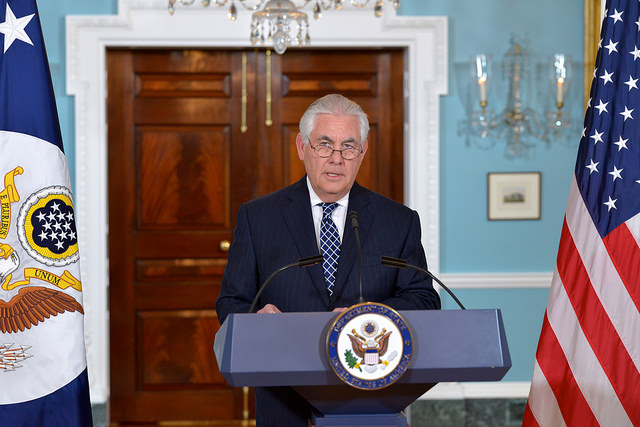
On 18 April the State Department
issued a press statement concerning a letter from the Secretary of State, Rex Tillerson, to the House Speaker, Paul Ryan, under the title ‘Iran Continues to Sponsor Terrorism’. However, the very first sentence of the statement contradicted its title. It unequivocally stated that ‘The US Department of State certified to US House Speaker Paul Ryan today that Iran is compliant through April 18th with its commitments under the Joint Comprehensive Plan of Action (JCPOA).’
What then was the purpose of the letter’s Orwellian title? Well, it was basically an attempt to shore up President Trump’s hard-line anti-Iranian image for the benefit of those of his allies at home and abroad who harbor a visceral hatred of Iran. Legally speaking, Tillerson could do nothing other than certify that Iran was in compliance with the agreement that had been entered into with the P5+1 in July 2015. That’s because the IAEA had repeatedly reported—
most recently on 24 February 2017—that Iran was in compliance with its commitments under the nuclear deal whether regarding the heavy water plant at Arak or the enrichment of uranium above 3.67% U-235.
However, the Trump administration have gone out of their way to portray Iran as America’s inveterate enemy that needs to be ostracised and, if possible, militarily decapitated. There are important constituencies, both inside and outside the US, which would prefer Iran be confronted militarily in order to neuter its real and potential interventionist capabilities in the Middle East.
Those in the US egging on the Trump administration to confront Iran are the right wing of the Republican Party and the powerful Israel lobby. Outside the US several American allies are also baying for Iranian blood. Israel, which feels threatened by a potential nuclear-armed competitor that could erode its nuclear monopoly in the region, is the prime advocate of a military invasion of Iran in order to denude it of its prospective nuclear capacity. Saudi Arabia and its Gulf Arab allies aren’t far behind in exhorting the US to go after Iran. Saudi Arabia’s endorsement of the Iranian nuclear deal was
extremely lukewarm and came with several caveats and warnings to Washington. However, unlike Israel, it refrained from attacking the deal publicly for fear of alienating the Obama administration.
Since the nuclear deal, however, the Saudi–Iranian competition in the Middle East has amplified. That’s particularly been the case in Syria where President Assad, supported by Iran, appears to be gaining ground at the expense of Saudi surrogates. The Saudi–Iranian cold war is also evident in Yemen where the Saudis and their allies deliberately exaggerate Iranian support for the Houthis in order to justify their own intervention on land and from the air in the Yemeni civil war. In general, the
Saudi rhetoric against Iran has become increasingly shrill, as Riyadh perceives that Tehran is gaining diplomatic ground in the region and internationally at the kingdom’s expense. On top of that the JCPOA convinced Saudi Arabia that it could no longer count the US as a reliable ally in its cold war against Iran.
In contrast with their perception of the Obama administration as weak-kneed vis-à-vis Iran, the Saudis have high hopes of President Trump overturning his predecessor’s strategy and confronting Iran more vigorously, even militarily. These hopes are largely based on Trump’s
campaign rhetoric denouncing the JCPOA and vowing to tear it up.
However, on assuming office the Trump administration has found that it can’t renege on the deal above all because the JCPOA is a multilateral agreement endorsed by the UN Security Council. The other partners to the agreement, especially Russia and China but also America’s European allies, have
made it clear that they won’t follow the US if it decides to go back on the agreement. That means the deal will stand minus the US; such a course will inevitably exacerbate tensions between the US and its European allies, not only on Iran but other issues as well.
Consequently, the Trump administration is stuck with the Iran nuclear deal whether it likes it or not. The only way for President Trump to placate the anti-Iran constituencies both at home and abroad is to introduce extraneous issues and engage in moral grand-standing and anti-Iranian rhetoric on the basis of these issues. That’s why Secretary Tillerson’s letter to Speaker Ryan, after certifying Iran’s compliance with the JCPOA, goes on to declare that ‘Notwithstanding, Iran remains a leading state sponsor of terror through many platforms and methods.’
It’s this sentence that provides the wording for the title of the State Department press statement regarding the Secretary’s letter to the Speaker. According to some sources President Trump
personally intervened to toughen the language of that letter although these words had nothing to do with the substance of the communication. The Iranians are intelligent enough to see through this game. Iran’s Foreign Minister Javad Zarif when asked to comment on the issue
declared ‘Do not pay much attention to Trump’s words.’
The main problem with the introduction of extraneous issues in discussions regarding the JCPOA is that it undermines public confidence in the value of an agreement that brought the world back from the brink of a major war. But maybe that’s the very reason why the Trump administration is engaged in this exercise. An additional reason could be that the Trump administration is calculating that by consistently taking a hard line vis-à-vis Iran despite the JCPOA it will succeed in discrediting the moderate President Rouhani, who strongly supports the nuclear deal, and thus help one of his hardline opponents to
win the presidential election scheduled for 19 May. A hardliner in office in Tehran would complement President Trump’s disdain for the nuclear agreement. It would thus make it easy for Washington to renege on the agreement and blame the Iranians for the breakdown of the deal.
 Print This Post
Print This Post